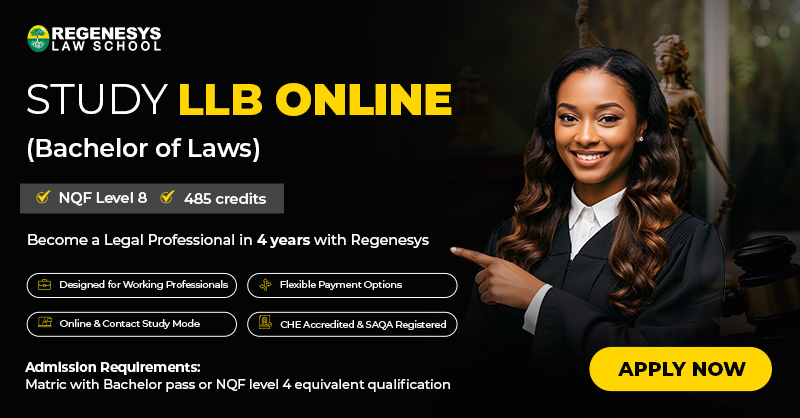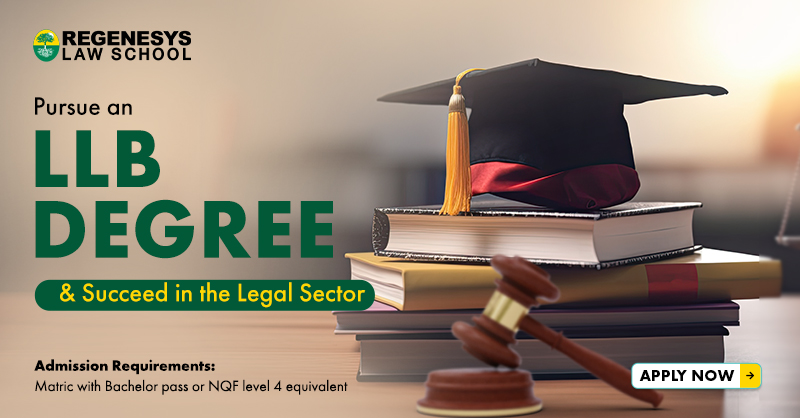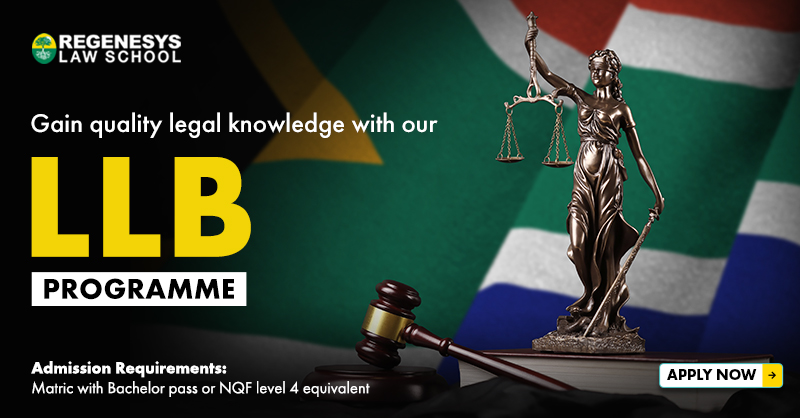A career in law starts with a solid academic foundation. The right Bachelor of Laws (LLB) builds legal knowledge, argument skills, and professional readiness. Where you study affects the style of learning and the practical experience you receive. It also shapes your route to vocational training and admission to practice.
In this article, we will explore LLB universities in South Africa, including options such as Regenesys Law School, and explain how to choose the right programme. You will learn about the degree routes, the role of accreditation, the types of institutions, and the career paths that follow an LLB.
The aim is to provide clear, practical information so you can make an informed choice about your legal education and future.

What is an LLB Degree?
The Bachelor of Laws (LLB) is the foundational professional law degree for anyone in South Africa aiming to enter the legal profession. It is a comprehensive undergraduate programme designed to equip students with a deep understanding of South African law, international legal principles, and the practical skills required for legal reasoning and advocacy. At its core, the LLB cultivates critical thinking, analytical prowess, and strong research skills, which are essential for a successful legal career.
Duration and Types of LLB Programmes
The LLB can be pursued through different study routes to accommodate students’ varying educational backgrounds and life circumstances. The programme is structured as a four-year undergraduate degree for students entering directly after completing their National Senior Certificate (NSC).
For individuals who already hold a bachelor’s degree in a field other than law, a shorter two-year postgraduate LLB pathway is available. Furthermore, recognising the needs of working professionals and other non-traditional students, institutions like Regenesys Law School offer flexible study options, including online learning and part-time programmes, making legal education more accessible.
|
Study Path |
Typical Duration |
Ideal For |
|
Undergraduate LLB |
4 years (full-time) |
Students entering directly from high school (matric). |
|
Postgraduate LLB |
2 years (full-time) |
University graduates who already have a degree in another field. |
|
Flexible Learning |
5-6 years (part-time/distance) |
Working professionals or those requiring a more flexible study schedule. |
Accreditation and Recognition in South Africa
In South Africa, the quality and standard of higher education qualifications are maintained through a national framework. The LLB degree is aligned with NQF Level 8 on the National Qualifications Framework (NQF), indicating a high level of academic rigour comparable to an honours degree. This NQF Level 8 status is a key indicator of the programme’s depth and is recognised both locally and internationally.
The Bachelor of Laws LLB degree at Regenesys Law School, like all accredited LLB programmes in the country, is designed to provide the necessary academic training for graduates to, upon completion of additional practical vocational training, be admitted as attorneys or advocates of the High Court of South Africa. The programme is structured to meet the national standards for legal education, ensuring graduates are prepared for the next steps in their professional journey.
Read more on: Is It Difficult to Study Law in South Africa?
Types of Institutions Offering the LLB in South Africa
Choosing where to study law is a crucial decision, as different institutions cater to varying needs. Here’s a concise overview of the main types of providers:
- Large Public Universities: State-funded institutions offering a traditional campus experience with extensive libraries, legal clinics, and research centres, but with competitive entry and large class sizes.
- Private Higher-Education Institutions: These providers focus on flexible, often online study modes with smaller classes and a strong emphasis on practical, applied learning, such as the LLB programme offered by Regenesys Law School.
- Distance and Open-University Models: Designed for maximum scheduling flexibility, these models provide self-study materials and are ideal for working professionals or those who cannot relocate for their studies.
- Specialist and Professional Law Colleges: These institutions focus squarely on vocational readiness, with curricula closely aligned to the practical skills required for legal practice and often featuring partnerships with vocational training providers.
When comparing options, consider your learning style, work commitments, and need for practical experience. Always confirm a programme’s accreditation with the Council on Higher Education (CHE) and its alignment with the Legal Practice Council’s requirements before applying.

How to Select the Right Institution for Your LLB
Choosing the right law school is a critical first step toward your legal career. Beyond the curriculum, you must verify that the institution and its LLB programme meet the formal standards required for professional practice. The following table outlines the key factors to check during your selection process.
|
Key Factor |
Why It Matters |
Verification Step |
|
Legal Practice Council (LPC) Eligibility |
This is the most crucial check. Only LLB programmes recognised by the LPC will allow you to register for Practical Vocational Training (articles of clerkship or pupillage) to become an attorney or advocate. |
Confirm directly on the institution’s website or by contacting the LPC that the programme is accepted for entry to vocational training. |
|
CHE Accreditation & DHET Registration |
Accreditation by the Council on Higher Education (CHE) and registration with the Department of Higher Education and Training (DHET) guarantee that the programme meets national academic quality standards. |
Look for clear accreditation statements on the institution’s website, often found in the programme details or a dedicated “Accreditation” section. |
|
NQF Level & Total Credits |
The LLB is pegged at NQF Level 8 with a specific credit value. This ensures the qualification is nationally and internationally recognised and comparable across different institutions. |
Verify the programme’s NQF Level (8) and total credit value (typically 360-485 for a 4-year degree) in the official prospectus or programme factsheet. |
|
Clear Professional Admission Route |
Some programmes may not adequately prepare students for or clearly outline the pathway to the final admission exams (e.g., Attorney’s Admission Exam or Bar exam). |
Review the programme’s stated outcomes to ensure it outlines the steps to vocational training and the subsequent professional admission exams. |
Read more on: Study Environmental Law in South Africa: Everything You Need to Know
Planning Your LLB: Career Goals and Financial Investment
Once you have shortlisted accredited institutions, the next step is to align your choice with your personal career ambitions and financial planning. This decision goes beyond the classroom, focusing on how the LLB will fit into your life and long-term goals.
When evaluating your options, consider these three personal criteria:
1. Define Your Career Pathway
Your reason for studying law should influence your choice of programme. If you aim to become a practising attorney or advocate, prioritise schools with a strong track record of preparing students for the Legal Practice Council’s admission exams and that offer practical components like moot courts. If you seek a legal background for a career in business, commerce, or government, a programme with modules in corporate law, compliance, or public policy may be a better fit.
2. Create a Financial Plan
Understanding the total cost of your degree is crucial. Beyond tuition, factor in expenses for textbooks, administrative fees, and potential technology for online learning. To manage this investment, explore all available funding options:
-
- Student Loans: Investigate student loans from major banks that are designed explicitly for accredited higher education programmes. These typically require a surety and have specific repayment terms.
- Payment Plans: Some schools provide flexible payment options. For example, Regenesys offers a FlexiPay Plan, allowing you to pay your tuition in manageable monthly instalments, making it easier to budget without a large upfront payment.
3. Match the Study Mode to Your Lifestyle
Be realistic about the time you can commit. Full-time, contact study is immersive but may preclude full-time work. Online or part-time programmes offer the flexibility to balance your career and family commitments, but require a high level of self-discipline.
Read more on: Where Can I Study for LLB in South Africa: Admission, Study Options and Careers
The Regenesys LLB: A Modern Legal Education
Regenesys offers an LLB designed for the modern learner. The programme aims to strike a balance between academic rigour and flexible study, as well as practical preparation.
Here is what the Regenesys programme offers:
- National accreditation and registration – The Regenesys LLB is CHE-accredited, and we are registered with DHET. This alignment confirms the programme meets national standards for professional progression.
- Practical and applied curriculum – The programme integrates moot activities, legal drafting tasks, and case studies to build skills relevant to vocational training.
- Flexible online delivery – The online format supports contact and online learners.
- Student support and employability focus – Regenesys offers coaching, webinars, and a student community to provide academic and career support.
For students seeking modern options among LLB universities in South Africa, Regenesys positions itself as a flexible, accredited choice.
Read more on: Know How to Meet the Entrance Requirements to Study Law in South Africa
How to Apply and Next Steps
Applying for an LLB involves careful planning and understanding the requirements. Taking structured steps ensures you choose the right programme and are prepared for professional training.
Here are the key actions to take when applying:
- Check programme requirements – Confirm academic entry criteria (matric, diploma or degree requirements, RPL rules) and verify that the LLB is accredited and professionally aligned (DHET registration, CHE accreditation and recognition by the Legal Practice Council where required).
- Complete the application process – Fill in the online application form on the law school’s admissions portal and supply basic personal details.
- Submit the application fee – Pay the required application fee to validate your submission (keep proof of payment).
- Finish the documentation process – Upload certified copies of required documents: ID, matric certificate, academic transcripts (or RPL evidence/CV where applicable) and any additional forms requested by admissions.
- Pay fees & start enrolment – If offered a place, accept the offer and arrange initial fee payment or a payment plan. Once fees and documentation are finalised, you’ll receive registration details and orientation information.
By following these steps, students can confidently apply to LLB universities in South Africa, with Regenesys Law School offering additional support through flexible applications and guidance.

Conclusion
Choosing an LLB is a significant step in a legal career. The best fit depends on your learning style, career aims, and personal circumstances. Always prioritise accreditation, curriculum content, and student support when comparing options. For modern, flexible study with recognised credentials, Regenesys offers a clear option among LLB universities in South Africa.
If you want an accredited, online pathway that balances practical training with national recognition, explore the Regenesys Education LLB programme, download the prospectus, or speak to an enrolment advisor to take the next step.
Frequently Asked Questions – FAQ
Can I study an LLB entirely online?
Yes. Accredited providers offer fully online LLB programmes that meet professional requirements.
How long does an LLB take?
A standard full-time LLB takes four years. Online and postgraduate routes vary in duration from two to six years.
Will an online LLB allow me to practise law?
If the programme is CHE-accredited and aligned with Legal Practice Council requirements, you can progress to vocational training and professional admission.
What entry marks do I need?
Entry requirements vary. Traditional universities often require higher Matric points. Other providers may use broader admission policies, including RPL.
Why consider Regenesys among LLB universities in South Africa?
Regenesys combines flexible online delivery, practical skills training, and recognised accreditation suited to vocational progression.







